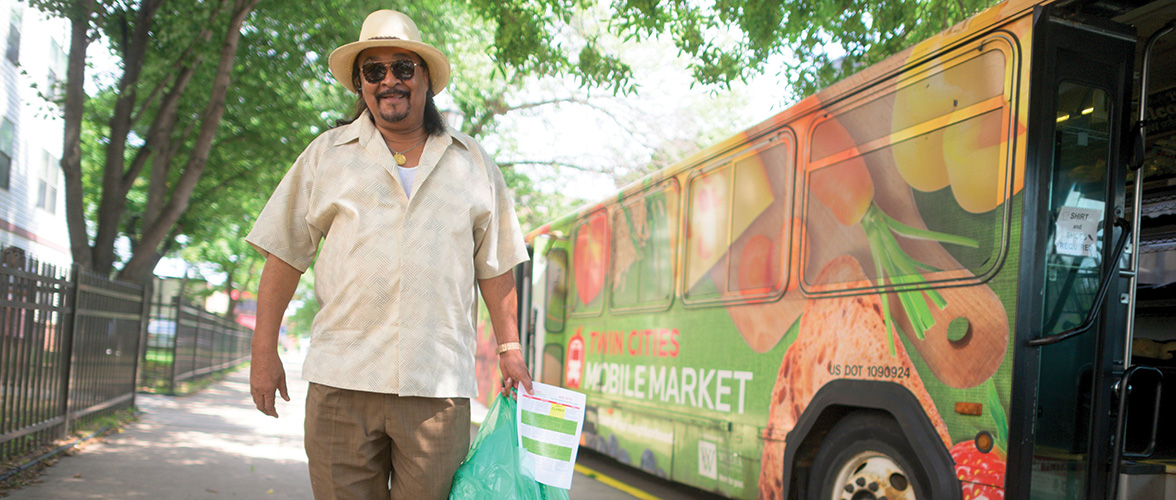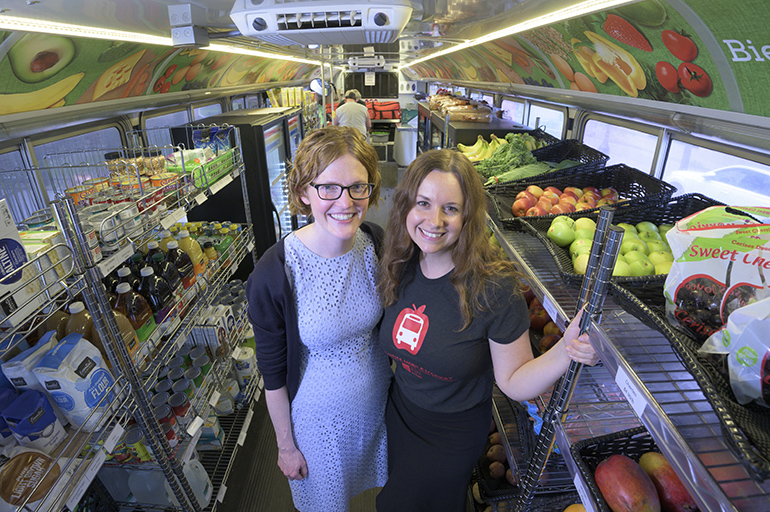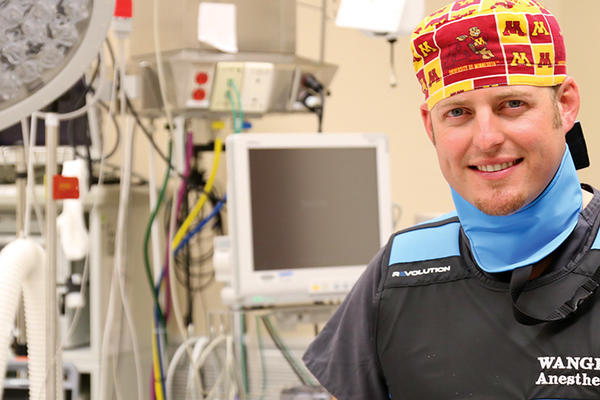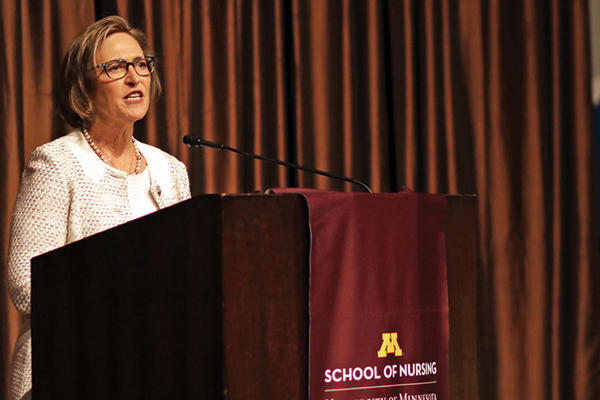Driven to deliver food access
Twin Cities Mobile Market brings affordable, healthy food to neighborhoods without easy access to grocery stores
October 14, 2019

Roger Brandon doesn’t drive or ride the bus, so he relies on friends to give him rides from his St. Paul apartment to run errands.
On a recent summer afternoon, he was grateful he didn’t need to lean on friends to pick up some bread and fruit. Instead, he used the Twin Cities Mobile Market, a retrofitted city bus that makes 24 weekly stops in communities with residents who experience difficulty accessing healthy and affordable food. The one-aisle mobile grocery store sells a variety of fresh fruits and vegetables, dairy, meats and staple dry goods but does not sell unhealthy foods, like chips or soda.
The goal of the market when it launched in 2014 was to improve access to healthy, affordable food by bringing it directly to peoples’ doorsteps. Partnerships with SuperValu and Hormel allow the mobile market to provide the same high-quality food with prices competitive with superstores.
“As you can imagine, if you are someone who lives in a neighborhood that doesn’t have a grocery store and you have nowhere to purchase healthy, affordable food, it’s really hard to have a healthy diet,” said Leah Porter, MA, founder and director of the Twin Cities Mobile Market, a program within the Wilder Foundation.
With 12% of Minnesotans currently experiencing limited incomes and limited access to food every day, the Twin Cities Mobile Market provides people like Brandon easier access to staple foods and produce. “I didn’t have any transportation to get to the store,” said Brandon. “I just saw a bus parked here that said market. I figured it would have most of the things that I needed. It was easy.”
Experiencing poor food access and a low income can lead to higher risks for poorer nutrition, increased obesity and more barriers — like lack of transportation and price — that make buying healthy food challenging, according to Assistant Professor and Mobile Market research partner Melissa Horning, PhD, RN, PHN.
“What we eat impacts how we grow, how we learn, how we manage our health and health outcomes down the road,” said Horning. “Having affordable, healthy food access is critical. It’s one of those things that’s also very hard to change, but that’s our mission.”
Community engagement, research and evaluation
From the beginning, community engagement and input has been the guiding force behind the mobile market’s development.
So far, the evidence is encouraging. Porter recalled the story of a regular customer who had limited mobility and a limited budget, which made grocery shopping difficult. Prior to shopping at the mobile market, she purchased food almost entirely out of the vending machine in her apartment building.
“It was about a year later when she was talking to some of our staff and she was saying, ‘Yeah, have you noticed how much weight I’ve lost? I lost 70 pounds in the last year,’” said Porter. “She said it was due to being able to buy food from the mobile market, instead of having to eat out of the vending machine.”
For Porter, it was important to know if the market was having the intended impact beyond just the anecdotes. “You don’t know what type of impact you are having without working with a researcher like Horning,” said Porter. “This is still a fairly innovative type of program and there isn’t a lot of data on it. So it’s really exciting to be on the cutting edge of collecting data to demonstrate the potential impact that this program has for improving healthy food consumption and access.”
As part of the research, they have assessed sales data, conducted surveys and focus groups, and captured measurement of dietary intake, height, weight and blood pressure for a more comprehensive understanding of how the mobile market impacts customers and the barriers they face in obtaining healthy food.
Promising results
The research shows that fruits and vegetables make up more than 50% of mobile market sales and that frequent mobile market customers are more likely to report they are eating more fruits and vegetables as a result of mobile market shopping when compared to infrequent mobile market customers.

Assistant Professor Melissa Horning, left, and Leah Porter, founder and director of the Twin Cities Mobile Market, are motivated by research that shows how invaluable the mobile market is to the customers using it.
“Our focus group research helped us understand how invaluable the mobile market is to the customers that use it,” said Horning. “It’s increasing their access to healthy foods and the customers really feel like they can afford those foods. The customers now have fruits and vegetables in their refrigerators, and they are eating them. They also appreciated that they weren’t being tempted by all the foods that aren’t on the bus.”
In terms of health outcomes, Horning noted early focus group data suggest promising results, like better management of weight, diabetes, blood pressure, and mental health and reductions in social isolation. Given the impact these conditions and social isolation can have on health — especially for those within underserved communities — these discoveries are important.
A four-year, United States Department of Agriculture grant will allow Horning to work with Porter to expand research evaluation of the mobile market, with an eye on customer satisfaction, barriers that still remain to accessing healthy foods and the reach of the program.
“Ultimately, my goal is to work with community partners like the Twin Cities Mobile Market to promote the health of families across a lifespan, especially to impact broad social determinants of health like food access to reduce health disparities,” said Horning. “If we really move the needle on food access, we could influence dietary intake and all the health outcomes related to diet.”
Read more
Twin Cities Mobile Market Food Delivery Model: A Preliminary Study Describing Results of a Customer Intercept Survey and Point of Sale Data for 2016
Horning, M. & Porter, L., Journal of Hunger and Environmental Nutrition, In press.


